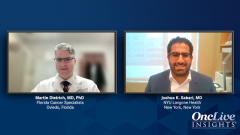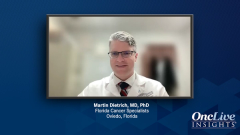
Non–Small Cell Lung Cancer: Informing 1L Therapy Selection With Molecular Testing
A brief review of how results from adequate molecular testing may help to inform the first-line management of non–small cell lung cancer.
Episodes in this series

Transcript:
Joshua K. Sabari, MD: The other point that you made is that some of our assays, the result is obtained within 24, 48 hours and that's usually particularly the PD-L1 expression. Walk me through a patient, 55 year old male, smoker, PD-L1 is 100% and you don't have the NGS back yet; what are you telling your patients? How do you counsel doctors out in the community here because it's reflexive that we want to start that PD1, PD-L1 inhibitor in the front-line setting.
Martin Dietrich, MD, PhD: That's a very, very common problem and in fact, this has been even worsened by the influence of some of the basically, the asynchronous of these IHC-based assays. I try to explain to patients that PD-L1 is not a perfect marker by any means, and that it must be contextualized in the proper setting of genomic analysis. I try to not look at it myself, I know it is tempting when you see a PD-L1 level, and maybe in the right setting, if you have a patient that is a smoker and you're hoping for a KRAS or BRAF mutation, but you would think of this as a double positive where you would hope for exceptionally well responding therapies in the immunotherapy compartment. That you really must practice patience. PD-L1 as standalone marker has absolutely no bearing, and if you read the guidelines, it really has a sequence of molecular testing first and then PD-L1 assessment second. I wish that this was more of a chronological sequence of events, because then you can avoid this mistake to act on what is seemingly appealing mechanism. But you can have an EGFR level of 100% in the background of EGFR or an ALK mutation, especially EGFR Exon 21 mutations, they have more association with smoking. And then obviously, immunotherapy has very little, if any, impact at least the currently available anti-PD-1 based therapies. There may be more targeted approaches using bi-specific antibodies that may have more of an immunogenic impact. But the number of alterations in an EGFR mutant lung cancer are just not sufficient to be recognizable on the immune radar, and I try to hold off, wait for the NGS panel, and look at the entire complex of biomarkers at the end. It's a 3-dimensional picture. You talked about the positive impactful ones, KRAS, EGRF, ALK, PD-L1, but also the negative ones, we're looking at STK11, we're looking at mutational burden for whatever it's worth, we're looking at obviously at KEAP1, P53 and other, it really becomes a multiplex genomic assessment for treatment selection. I'm trying to be really disciplined and have the full panel available at the time of decision-making. Sometimes my hands are tied, and then I move into chemotherapy or radiation approaches, but withholding targeted or immunotherapies until I have a final answer.
Joshua K. Sabari, MD: Extremely controversial to use some immunotherapy in the frontline setting, specifically in a driver mutant patient population. I agree with you, if you don't have full molecular testing back, you can't make the right decision for a patient. And in a patient who is in visceral crisis, which is different than emotional crisis, visceral crisis is heavy burden of disease, symptomatic, cough, shortness of breath, hemoptysis; that's a patient who I'll start with Cycle 1 of carboplatin-pemetrexed and maybe dial in immunotherapy in a second cycle if they're driver negative. But, again, one of the worse things we can do for our patients, if they have an EGFR or an ALK fusion, if we give them immunotherapy in the frontline setting, not only are they not going to respond to therapy, but you might illicit immune-mediated toxicities when you then start the correct targeted therapy in the next line. So important to have that information back when you sit down with your patient.
Transcript edited for clarity.





































